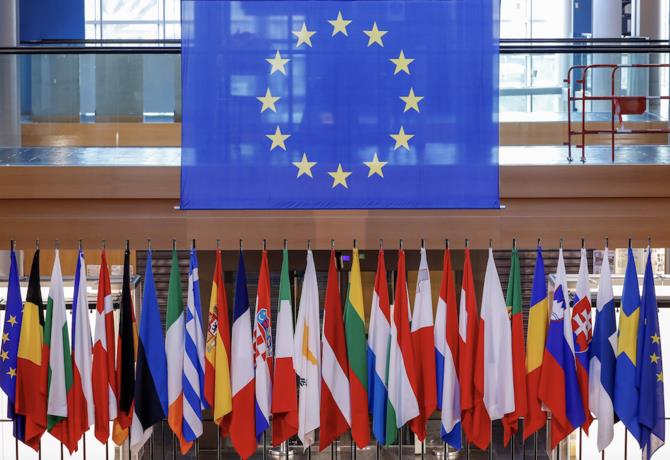
In recent years, international awareness of, and interest in, issues related to sustainability have surged, helping to drive a new wave of economic value creation. However, regulation of this has been largely stuck on the political back burner. That might now be changing.
This is underlined by the journey the 27 members of the EU have been on with the development of their proposed Corporate Sustainability Due Diligence Directive. It is expected to secure final political ratification by the European Parliament on April 24, after about four years of consideration by Brussels.
The proposed directive would place an obligation on European businesses to provide documentation that confirms the products they import are in compliance with human rights and environmental standards, including those governing child and forced labor. It will also codify in EU law, for the first time, the UN Guiding Principles on Business and Human Rights.
The obligation to prevent, end or mitigate harms to human rights and the environment, such as child labor or loss of biodiversity, will also apply to a company’s so-called “upstream” partners in the design and manufacturing processes, as well as “downstream” partners who transport, store or distribute their products. That said, firms in the financial sector will only have to focus on upstream partners as part of their due diligence.
Businesses will also have to prepare plans setting out how they intend to transition to a low-carbon economy, including deadlines for hitting climate targets and the key actions and investments required to deliver on their commitments.
Authorities in Brussels say that one of the big advantages of the new directive is that it will avoid international companies having to navigate a plethora of national, potentially incompatible rules within the 27-member single market. It will apply to all firms operating in the bloc that have more than 1,000 employees and net global turnover of more than €450 million ($485 million). Fines for failing to comply with the new rules could be as high as 5 percent of net global turnover.
While the measures have been welcomed by some political stakeholders, numerous business-lobby groups have criticized them. Markus Beyrer, the director general of BusinessEurope, for example, said the directive would add “unparalleled obligations, set harsh sanctions with potentially existential implications for companies, and unilaterally expose them to litigation from all parts of the world.”
He adds: “European companies with global operations, some with millions of indirect relationships, will be put at a disadvantage compared to their global competitors.”
The new EU sustainability directive is the latest example of the bloc’s attempts to set the global regulatory agenda by taking key actions in a growing range of policy areas.
Andrew Hammond
On the other side of the ledger, some nongovernmental organizations have criticized what they describe as messy “end game” compromises in recent weeks, which they say significantly undermine the likely effects of the directive.
Earlier drafts, for example, sought to target firms with more than 500 employees and turnover of €150 million, which would have thrown a significantly larger net over firms operating within the EU. The German and Italian governments lobbied against this, fearing it would hit their economies harder than most because of the relatively high numbers of small and medium-sized businesses they host.
Moreover, the latest draft of the directive removed civil liability provisions that potentially would have permitted trade unions to sue noncompliant firms. This provision was opposed by several countries, including Finland.
There was also a significant compromise in the form of a staged approach to the introduction of the new rules over a period of three-to-five years, depending on the size of businesses. This will mean a multi-year transition phase stretching into the second half of the decade.
For all the compromises and criticisms of the directive, however, its likely approval points to the continuing ambition of the EU to entrench itself as a global regulatory superpower. With this latest mechanism, the bloc clearly seeks to help set the “rules of the road” for the global corporate sustainability agenda. In so doing, it is likely to influence equivalent regulatory frameworks in other nations worldwide. This is what scholars, such as Anu Bradford, a legal expert in the US, have termed the “Brussels effect.”
By developing far-reaching regulations that have significant bearing on the global business environment outside the 27 EU member states, the Brussels-based club is trying to ensure that European values shape international policy in a wide spectrum of policy areas. This includes not only aspects such as sustainability and the environment, but also antitrust, data privacy, and consumer health and safety, as a growing number of global firms adopt EU standards as global standards.
In recent weeks, for instance, the EU hit the headlines for being a “first mover” in another key policy area, thanks to its adoption of the world’s first comprehensive legislation on artificial intelligence, after a breakthrough deal was negotiated after many months of consideration. This new regulatory framework, which once again was criticized by some business groups, represents the strictest set of rules yet, anywhere in the world, governing the emerging technology.
To many observers of global affairs, this shows that the EU has a legitimate claim to be a genuine global power. This is despite its traditional lack of hard power, or military might, compared with nations such as the US, China, and Russia.
The new EU sustainability directive is therefore only the latest example of the bloc’s attempts to set the global regulatory agenda by taking key actions in a growing range of policy areas.
And although it has been criticized by some campaigners for not going far enough, the directive is nonetheless a first for any major, global power and its ambitions might yet be scaled up over time.
Andrew Hammond is an associate at LSE IDEAS at the London School of Economics.












